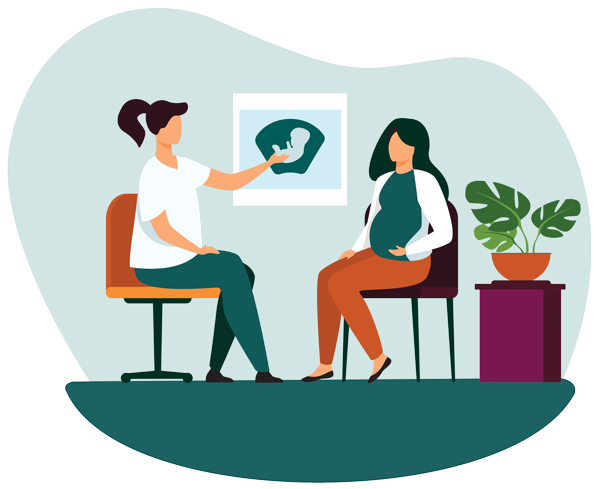
Appendicitis Ultrasound Scan
Appendicitis can cause a sharp pain in the middle of your belly, near the belly button. After a few hours, this pain usually shifts to the lower right side, getting worse and continuous. It might hurt even more when you press that area, cough, or walk. If you’re feeling this, it’s crucial to get checked out.
Frequently Asked Questions:
What is Appendicitis?
Appendicitis is an inflammation of the appendix, a small, finger-like pouch attached to the beginning of the large intestine. Symptoms often include sudden pain that begins on the right side of the lower abdomen, nausea, vomiting, and a decreased appetite. If not treated, the appendix can burst, leading to more severe complications.
What are the symptoms of Appendicitis?
Symptoms of appendicitis include:
- A sudden pain that begins around the navel and often shifts to the lower right abdomen.
- The pain becomes sharper and more severe with time.
Swelling or bloating in the abdomen. - Loss of appetite.
- Nausea and vomiting.
Low-grade fever that may worsen as the illness progresses. - Constipation or diarrhea.
Abdominal tenderness, especially when the right side is pressed. - Difficulty passing gas.
If you experience symptoms of appendicitis, it’s important to seek medical attention immediately, as the condition can worsen rapidly.
When to see doctor?
See a doctor immediately if you experience:
- Sharp pain that starts near the navel and shifts to the lower right abdomen.
Intensifying pain over hours. - Nausea and vomiting.
- Low-grade fever.
- Abdominal swelling.
- Loss of appetite.
Prompt attention is essential, as an untreated appendix can rupture.
What does the appendicitis ultrasound scan examine for?
The appendicitis ultrasound scan examines the appendix to identify signs of inflammation or swelling, which are indicative of appendicitis. The scan can also detect if there’s an abscess or a blockage in the appendix, and it can rule out other conditions that might mimic appendicitis symptoms, such as an ovarian cyst or kidney stone.
What could be discovered during an ultrasound scan for appendicitis issues?
- Inflammation in the appendix or appendicitis
- Cancer or other life-threatening diseases in solid organs like; Liver, kidney, spleen, and pancreas, that can cause pain
- Fluid collection in the abdominal cavity
- Obstruction in the biliary or pancreatic ducts and the cause of obstruction
- Enlargement or inflammation of the spleen, liver or both (Splenomegaly, Hepatomegaly, Hepatosplenomegaly)
- Gallstone and other pathologies in the gallbladder
- Enlarged lymph nodes
- Stone, cyst, tumour, collection or blockage in kidneys
- Abdominal Aorta dilation (Aneurysm)
Pre-Examination Preparation.
- Drink One liter of still water (2 Pints) One hour before your scan.
- Do NOT use the toilet so you would arrive with a full bladder.
- Medication can be taken as normal.
Appendicitis requires an urgent ultrasound, and most patients haven’t fasted beforehand which is absolutely fine.
What is the procedure for an appendicitis ultrasound scan?
The procedure for an appendicitis ultrasound scan involves the following steps:
- The patient is positioned lying down on an examination table, typically on their back.
- A clear gel is applied to the lower right abdomen to ensure good contact between the skin and the ultrasound probe.
- The sonographer or radiologist will move the ultrasound probe (transducer) over the area of interest, sending sound waves into the body.
- The sound waves bounce back and produce images on a screen, giving a real-time view of the inside of the abdomen.
- The sonographer will look for signs of inflammation, swelling, or any other abnormalities in the appendix.
- The patient might be asked to change positions or hold their breath briefly during the scan to get clearer images.
- Once the examination is complete, the gel will be wiped off, and the patient can dress.
- The results are then analyzed, and a report is provided to the referring doctor or the patient.
It’s a non-invasive and typically painless procedure, taking about 15-30 minutes to complete.
When will I get my report?
After your scan, we’ll talk through the results with you. If we spot signs of appendicitis, it’s important to go straight to the A&E. We’ll also let your GP know and give you a written report. Remember, just because we don’t see appendicitis on the ultrasound doesn’t mean it’s not there. Ultrasounds can show if appendicitis might be present, but they aren’t perfect at ruling it out. Always chat with your doctor about the next steps.
Appendicitis Ultrasound Scan
Checks For:-
Appendix
-
life-threatening diseases
-
Fluid collection
-
Gallstone
-
Sign of Cancer
-
Enlarged lymph nodes
-
Stone, cyst, tumour
10 Years of Experience
Our Medical Ultrasound specialists are fully qualified with more than 10 years of experience. They are accredited and registered with their respective governing bodies.
latest technology
Using the latest technology, We follow all local protocols and national guidelines to provide the best diagnostic ultrasound service in London.
No Waiting List
We offer urgent appointments with no waiting list. We also collaborate with Private GPs, Specialists, and an onsite Pathology Laboratory.
No need for Referral
We offer a professional and affordable private Ultrasound Scan Service, allowing you to self-refer without the need for any referral from your GP.

